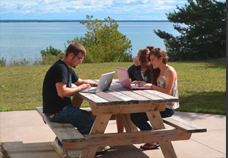Quick Links
- Home
-
About BMCC
-
Admissions
-
Financial Aid
- Net Price Calculator
- Scholarships & Grants
- Apply for FAFSA
- Financial Aid Refunds and Disbursement Schedule
- Return of Financial Aid or Title IV Funds
- Student Employment
- Forms & Links
- Understanding Tuition
- Student Billing
- Financial Aid Staff
- Higher Education Emergency Relief Fund (HEERF)
- Emergency Aid Program
-
Financial Aid
- Academics
-
Student Services
-
Contact Us

Address:
12214 W. Lakeshore Dr
Brimley, MI 49715
(906) 248-3354
Get Directions
Welcome new students, faculty, and staff! If you're having trouble accessing your BMCC email, Moodle, Student Records, etc. you can submit a ticket at support.bmcc.edu. Please be sure to include a currently active external email address of yours (or phone number where you can be reached), like Gmail, Yahoo, Hotmail, and so on. After submitting a ticket using the form, if you're not seeing a reply in your inbox, be sure to check your spam or junk folder for a reply. You can call IT to check on your ticket status by calling (906) 248-3354, toll free: (866) 967-2622 (BMCC) and ask for the Information Technology or IT department.
Academics
Bay Mills Community College operates on a semester system. The fall semester begins the last week of August or the first week of September and is completed in December. The spring semester begins in January and ends in May. BMCC offers a limited summer schedule which may include accelerated summer sessions. Summer courses are offered from May to August. A schedule listing hours, room numbers, and courses is published prior to each semester.
Each student enrolled at Bay Mills Community College will be assigned an academic advisor who approves the students' course loads, changes in academic studies, and helps with academic issues.
It is necessary for students to meet with an academic advisor every semester to get approval for the courses to be taken. Students are strongly encouraged to check with an academic advisor during the semester to discuss their progress and any difficulties they may be encountering. Academic advisors are available to discuss and help solve any problems students may encounter in achieving their educational goals, including referrals for tutoring or assistive technology.
BMCC is committed to excellence in teaching and learning and is equally committed to assessment as a means of ensuring effective student learning. Assessment is a continuous process of review and refinement at the course, program, and institutional level. Thus, faculty and administration are engaged in ongoing assessment activities that measure student learning based on specific goals and objectives. The results provide regular feedback, which is used to strengthen instructional practices and to develop strategies for improved learning. Students are invited to participate in assessment committee meetings to learn how the assessment plan works and how the results might benefit them.
To be considered full-time a student must carry at least 12 credits; anything less is considered part-time. One credit or one semester hour are equal to 15 contact hours of instruction. Students who wish to take more than 18 credits are required to receive permission from their academic advisor and the Vice President for Academic Affairs and to maintain a minimum grade point average of 2.7.



